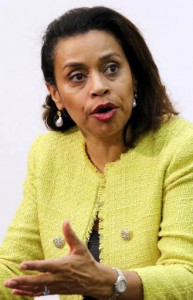Elayne Whyte Gómez visits Hiroshima for U.N. Conference on Disarmament Issues
Nov. 30, 2017
by Yumi Kanazaki, Staff Writer
On November 29, Elayne Whyte Gómez, who chaired the U.N. negotiations that established the Treaty on the Prohibition of Nuclear Weapons in July, spoke to the Chugoku Shimbun and other media outlets at the International Conference Center Hiroshima in Naka Ward. Ms. Whyte Gómez, the Ambassador of the Permanent Mission of the Republic of Costa Rica to the United Nations Office in Geneva, is visiting Hiroshima for the United Nations Conference on Disarmament Issues. In her comments, highlighted below, she stressed her appreciation for the role that the A-bomb survivors played in realizing the nuclear weapons ban treaty.
The Treaty on the Prohibition of Nuclear Weapons was established with the support of 122 nations, and the Nobel Peace Prize was awarded to the International Campaign to Abolish Nuclear Weapons (ICAN), an international non-governmental organization (NGO). Such accomplishments have certainly made this an outstanding year.
Hiroshima, Nagasaki, and Japan itself are symbols of the goal to realize a world without nuclear weapons. When I presented the final text of the treaty to the conference for its final adoption, I delivered this special message: “The international community heard the hibakushas’ cry and adopted a norm that illegitimizes nuclear weapons.”
This treaty creates a legal norm that can strengthen disarmament and the nuclear non-proliferation regime of already existing norms, such as the Nuclear Non-proliferation Treaty (NPT). Moreover, it incorporates very strong and comprehensive provisions. At the same time, it also has the flexibility to consider additional measures at the meetings of state parties. Additionally, this treaty is progressive because it was born from a true interactive dialogue between the A-bomb survivors, civil society, and governments.
All nations are now urged to sign the nuclear weapons ban treaty and ratify it as soon as possible. But we estimate that a two- or three-year process is a realistic expectation for the treaty to enter into force, in line with such precedents as the Cluster Munitions Convention.
Amid rising international tensions, we cannot go back to the same thinking that created and spread the nuclear arms race that we witnessed during the Cold War. I don’t agree with the perception that North Korea’s launch of missiles and its nuclear development overshadow the importance of this treaty. To the contrary, it even proves that we need to move beyond the nuclear era.
Being from Costa Rica, a country that has decided to abolish its army and rely on international laws and the U.N. charter for the defense of its security, I would like to convey that the experience of Japan is not only about the survivors and their families here. A nuclear catastrophe could happen to any society either from intentional use, miscalculation, or unintentional use, and in a single day, whole populations would disappear. There is now hope and expectation for the role that Japan can play in this new momentum after the adoption of the nuclear weapons ban treaty.
(Originally published on November 30, 2017)
On November 29, Elayne Whyte Gómez, who chaired the U.N. negotiations that established the Treaty on the Prohibition of Nuclear Weapons in July, spoke to the Chugoku Shimbun and other media outlets at the International Conference Center Hiroshima in Naka Ward. Ms. Whyte Gómez, the Ambassador of the Permanent Mission of the Republic of Costa Rica to the United Nations Office in Geneva, is visiting Hiroshima for the United Nations Conference on Disarmament Issues. In her comments, highlighted below, she stressed her appreciation for the role that the A-bomb survivors played in realizing the nuclear weapons ban treaty.
The Treaty on the Prohibition of Nuclear Weapons was established with the support of 122 nations, and the Nobel Peace Prize was awarded to the International Campaign to Abolish Nuclear Weapons (ICAN), an international non-governmental organization (NGO). Such accomplishments have certainly made this an outstanding year.
Hiroshima, Nagasaki, and Japan itself are symbols of the goal to realize a world without nuclear weapons. When I presented the final text of the treaty to the conference for its final adoption, I delivered this special message: “The international community heard the hibakushas’ cry and adopted a norm that illegitimizes nuclear weapons.”
This treaty creates a legal norm that can strengthen disarmament and the nuclear non-proliferation regime of already existing norms, such as the Nuclear Non-proliferation Treaty (NPT). Moreover, it incorporates very strong and comprehensive provisions. At the same time, it also has the flexibility to consider additional measures at the meetings of state parties. Additionally, this treaty is progressive because it was born from a true interactive dialogue between the A-bomb survivors, civil society, and governments.
All nations are now urged to sign the nuclear weapons ban treaty and ratify it as soon as possible. But we estimate that a two- or three-year process is a realistic expectation for the treaty to enter into force, in line with such precedents as the Cluster Munitions Convention.
Amid rising international tensions, we cannot go back to the same thinking that created and spread the nuclear arms race that we witnessed during the Cold War. I don’t agree with the perception that North Korea’s launch of missiles and its nuclear development overshadow the importance of this treaty. To the contrary, it even proves that we need to move beyond the nuclear era.
Being from Costa Rica, a country that has decided to abolish its army and rely on international laws and the U.N. charter for the defense of its security, I would like to convey that the experience of Japan is not only about the survivors and their families here. A nuclear catastrophe could happen to any society either from intentional use, miscalculation, or unintentional use, and in a single day, whole populations would disappear. There is now hope and expectation for the role that Japan can play in this new momentum after the adoption of the nuclear weapons ban treaty.
(Originally published on November 30, 2017)








